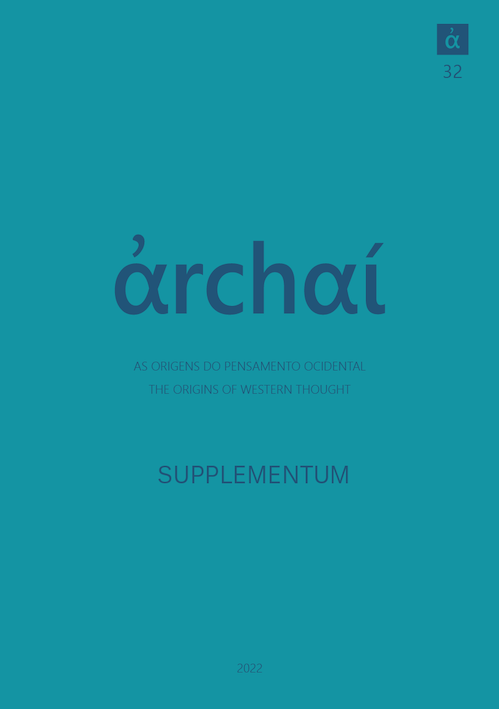Plato’s Lysis and the Erotics of Philia
DOI:
https://doi.org/10.14195/1984-249X_32_42Palavras-chave:
Plato, Lysis, friendship, philia, eros, desire, AristotleResumo
This paper argues that the account of friendship (philia) present in Plato's dialogue the Lysis is rife with the disruptive and maddening force of eros.By its end it is no longer clear whether the familiar sorts of personal relationships that we typically count as friendships, and which Aristotle discusses with great sensitivity and appreciation in theNicomachean Ethics,can be meaningfully sustained. To support this thesis, the paper analyzes each of the seven, relatively self-contained arguments Socrates offers. In addition, it shows how the dramatic context in which these arguments are embedded foreshadows the dialogue's principal objective: to blur the distinction between philiaand eros by allowing the latter to infect the former
Downloads
Referências
BAYWATER, J. (ed.) (1894). Aristotlelis. Ethica Nicomachea Oxford, The Clarendon Press.
BURNET, J. (1903). Platonis. Opera Oxford, Oxford University Press.
DOVER, K. (1980). Greek Homosexuality New York, Random House.
GADAMER, H.-G. (1980). Dialogue and Dialectic SMITH, P. C. (trans.). New Haven, Yale University Press.
MILLER, M. (1991). Plato’s Parmenides. State College, Pennsylvania State University Press.
MILLER. M. (2004). The Philosopher in Plato’s Statesman Las Vegas, Parmenides Publishing.
NAILS, D. (2002). The People of Plato Indianapolis, Hackett.
NELSON, S. (2009). Hesiod's Theogony. Newburyport, Focus.
PENNER, T.; ROWE, C. (2005). Plato's Lysis Cambridge, Cambridge University Press.
ROOCHNIK, D. (2001). The Deathbed Dream of Reason: Socrates’ Dream in the Phaedo Arethusa 34, p. 239-258.
Downloads
Publicado
Como Citar
Edição
Seção
Licença
Copyright (c) 2023 David Roochnik

Este trabalho está licenciado sob uma licença Creative Commons Attribution 4.0 International License.
Dado o acesso público desta revista, os textos são de uso gratuito, com obrigatoriedade de reconhecimento da autoria original e da publicação inicial nesta revista. O conteúdo das publicações é de total e exclusiva responsabilidade dos autores.
1. Os autores autorizam a publicação do artigo na revista.
2. Os autores garantem que a contribuição é original, responsabilizando-se inteiramente por seu conteúdo em caso de eventual impugnação por parte de terceiros.
3. Os autores garantem que a contribuição que não está em processo de avaliação em outras revistas.
4. Os autores mantêm os direitos autorais e concedem à revista o direito de primeira publicação, sendo o trabalho licenciado sob a Creative Commons Attribution License-BY.
5. Os autores têm permissão e são estimulados a publicar e distribuir seu trabalho on-line após a publicação na revista.
6. Os autores dos trabalhos aprovados autorizam a revista a, após a publicação, ceder seu conteúdo para reprodução em indexadores de conteúdo, bibliotecas virtuais e similares.
7. É reservado aos editores o direito de proceder ajustes textuais e de adequação do artigo às normas da publicação.



